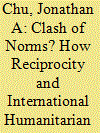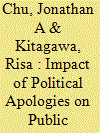| Srl | Item |
| 1 |
ID:
165882


|
|
|
|
|
| Summary/Abstract |
Reciprocity is one of the oldest principles of warfare, but humanitarian norms embedded in international humanitarian law (IHL) prohibit reciprocity over various wartime acts. When it comes to the treatment of prisoners of war (POWs), how do these conflicting norms shape public opinion? One perspective is that citizens who learn about IHL acquire an unconditional aversion to abusing POWs. Alternatively, people may understand IHL as a conditional commitment that instead strengthens their approval for reciprocal conduct. Survey experiments fielded in the United States support the latter view: people’s preferences depend on the enemy’s behavior, and this “reciprocity effect” is largest among those who believe that the United States is legally committed to treating POWs humanely. Puzzlingly, prior studies do not find a reciprocity effect, but this is due to their use of a no-information experimental control group, which led to a lack of control over the subjects’ assumptions about the survey
|
|
|
|
|
|
|
|
|
|
|
|
|
|
|
|
| 2 |
ID:
179768


|
|
|
|
|
| Summary/Abstract |
Apology diplomacy promises to assuage historical grievances held by foreign publics, yet in practice appears to ignite domestic backlash, raising questions about its efficacy. This article develops a theory of how political apologies affect public approval of an apologizing government across domestic and foreign contexts. The authors test its implications using large-scale survey experiments in Japan and the United States. In the surveys, the authors present vignettes about World War II grievances and randomize the nature of a government apology. They find that apology-making, both as statements acknowledging wrongdoing and as expressions of remorse, boosts approval in the recipient state. But in the apologizing state, backlash is likely among individuals with strong hierarchical group dispositions—manifested as nationalism, social-dominance orientation, and conservatism—and among those who do not consider the recipient a strategically important partner. This microlevel evidence reveals how leaders face a crucial trade-off between improving support abroad and risking backlash at home, with implications for the study of diplomatic communication and transitional justice.
|
|
|
|
|
|
|
|
|
|
|
|
|
|
|
|